Un cop de res by Gerard Altaio / 打油
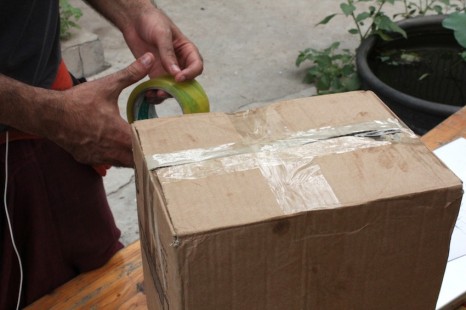
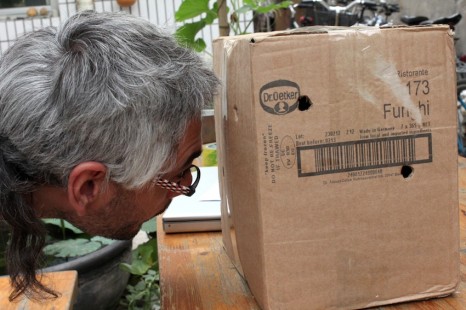
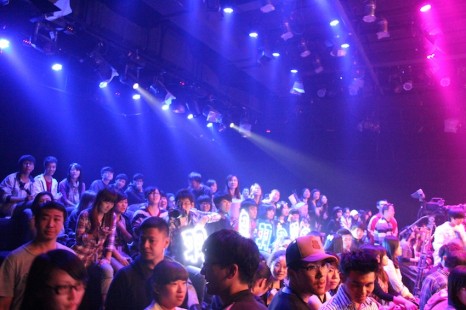
For the next meeting of the Happy Friends Reading Club, we will be reading Donna Harraway’s essay from 1985, “A Cyborg Manifesto: Science, Technology, and Socialist-Feminism in the Late Twentieth Century.” We have versions in English and in Chinese to distribute, so please let us know if you want to receive a copy.
The plan is to initially separate the language groups and then try a crossover, so language ability is not the ultimate human obstacle!
The meeting will take place at HomeShop at 6 pm on July 22nd, 2012.
下一期的“快乐朋友阅读小组”
2012年7月22日晚上6 点,欢迎来家作坊参加!
 时间 posted on: 6 July 2012 |
时间 posted on: 6 July 2012 |  发布者 author: michael eddy |
发布者 author: michael eddy |  评论 comment (0) |
评论 comment (0) | 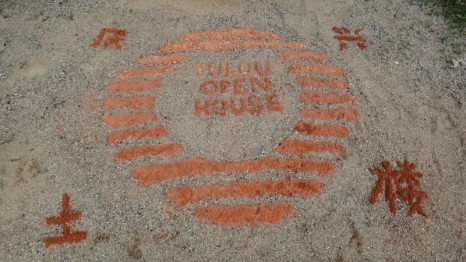
土楼茶话会 Tulou Tea Time
日期/时间 date/time__ 7月8日周日,下午3点至5点 | Sunday, 8 July, 15:00-17:00
地点 location__ 家作坊 HomeShop [地图/map]
这周日,家作坊、遥遥工作室和新界工作室汇聚一堂,品尝铁观音,分享在土楼的美好时光,回顾上个月在福建田中村组织的“土楼参观开放日”项 目。合作组织者吴遥遥, 高文雅及Anna Laura GOVONI (都市实践研究部)将介绍此项目,艺术家和其他项目参与者也将出席,开放问答环节,品茶闲聊,交流土楼社区最新的消息——其中贯穿对艺术、建筑和可持续性在当下及未来的思考。周日下午来家作坊了解更多信息吧!
This Sunday, HomeShop, Studio YaoYao and New Territories Studio come together to share tieguanyin (the tea of the iron goddess of mercy, of course) and tulou time for a dialogue and review of the Tulou Open House project organized last month in Tianzhong village, Fujian. Co-organizers Dana WU, Samantha CULP and Anna Laura GOVONI (Urbanus Research Bureau) will introduce the project, and artists and other project participants will be on hand for an open Q&A and teatime chitchat about the latest goings-on in the tulou community —— relaxation intersects with present and future considerations of art, architecture and sustainability. Learn more about it this Sunday afternoon at HomeShop!
 时间 posted on: 4 July 2012 |
时间 posted on: 4 July 2012 |  发布者 author: 家作坊 HomeShop |
发布者 author: 家作坊 HomeShop |  评论 comment (1) |
评论 comment (1) |
全球朋友们和我们的小公园在地球之上,今天的活动有现场直播!
请到:www.homeshop.org.cn/live.html来看和跟我们交流!
Dear friends around the world and baby kitty Small Park somewhere out there, today’s event will be live broadcast and viewable from the comfort of your internet connection! As long as ours holds out, please step in to watch and comment at www.homeshop.org.cn/live.html
行为和微广播之夜 …
An evening of actions and micro-casting
欢迎在7月7日周六晚6点至9点参加在家作坊举行的既具表演性又有参与性的“无花果树下,红枣树之上”——一个行为和微广播之夜。当晚交叠进行的“演出”有:
You are welcome to join us on Saturday, July 7th from 6 pm to 9 pm for an evening of performative and participatory contributions to the HomeShop ambiance, taking the form of several temporally overlapping actions:
————
“无花果树下, 红枣树之上”由家作坊组办,是家作坊和“与我行走”项目合作的第一个活动。 “与我同行”由德国艺术家Petra JOHNSON发起,将于2012-2013年期间在科隆和北京同时进行。“与我行走”项目得到北京德国文化中心·歌德学院(中国)和德国科隆市支持。
Organized by HomeShop. Under the fig tree, above the date tree is the first installment in a cooperation between HomeShop and Walk with Me, a project initiated by Petra JOHNSON, to be realized throughout 2012 and 2013, between Cologne and Beijing. Walk with Me is kindly supported by the Goethe-Institut Beijing and the city of Cologne.
 时间 posted on: 4 July 2012 |
时间 posted on: 4 July 2012 |  发布者 author: 家作坊 HomeShop |
发布者 author: 家作坊 HomeShop |  评论 comments (2) |
评论 comments (2) | Update你一下… Just a few updates…
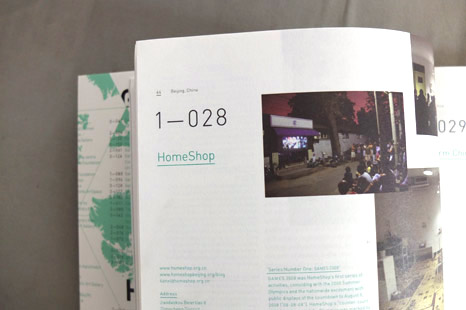 谢谢纽约新博物馆和《Art Asia Pacific》杂志,上个月收到他们一起出版的《艺术空间目录》!曲哥也用过当枕头,很实用!
谢谢纽约新博物馆和《Art Asia Pacific》杂志,上个月收到他们一起出版的《艺术空间目录》!曲哥也用过当枕头,很实用!
Last month we received our copy of The New Museum & Art Asia Pacific‘s Art Spaces Directory. Thank you to all those who put in hard work to put it together, it’s a big book!
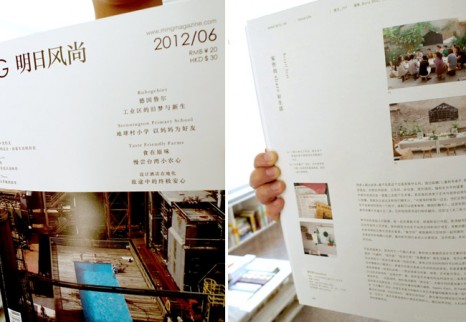 2010年被叫成“Life Stylists”之后,《明日风尚》给家作坊做了新定义:“Retail Star”。
2010年被叫成“Life Stylists”之后,《明日风尚》给家作坊做了新定义:“Retail Star”。
After being called “Life Stylists” in 2010, MING magazine now gives new life to HomeShop. In June 2012, we are the “Retail Star”.
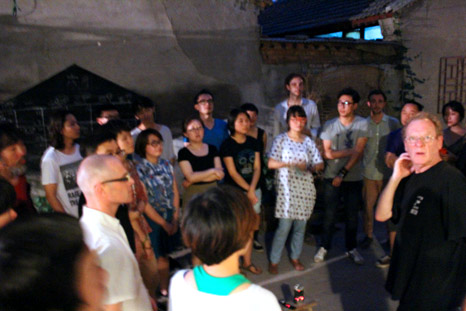
听一听我们当天的野声合唱队!上个星期跟撒把芥末组织的第13届“家-工-作坊”很成功,谢谢菲尔·明顿老爷爷和陈皓伊的外星人声指导!
Thank you to SubJAM, Phil MINTON and Audrey CHEN for organizing HomeWorkShop No. 13 with us last week! Listen to a selected recording of the evening above.
(摄影 photo__ Michael EDDY)
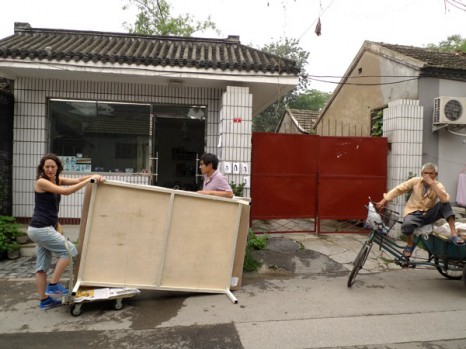 2011年6月,Pilar和欧阳正在搬她从宜家买的床。Pilar and Xiao prepare to move the bed she bought from IKEA, June 2011. (摄影 photo__ 何颖雅 Elaine W. HO)
2011年6月,Pilar和欧阳正在搬她从宜家买的床。Pilar and Xiao prepare to move the bed she bought from IKEA, June 2011. (摄影 photo__ 何颖雅 Elaine W. HO)
这周六30号家作坊将网上参加艺术家Laura YUILE和Orsoly BAJUSZ举办的“创意与策划实践舒适区:一个以特定场域会议”,在英国曼彻斯特市的宜家家具店。
On Saturday, 30 June, HomeShop will interweb-ly participate in the the “Site-Specific Symposium on Comfort Zones in Creative and Curatorial Practices” hosted by Laura YUILE and Orsolya BAJUSZ at the IKEA in Manchester, UK.
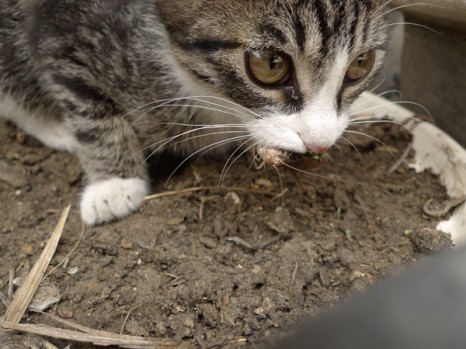 前几天欧阳和曲哥把蝈蝈放生了,过几个小时小公园抓住蝈蝈把它吃掉了。我们说:“曲哥爱生命,却经常误杀生命!”
前几天欧阳和曲哥把蝈蝈放生了,过几个小时小公园抓住蝈蝈把它吃掉了。我们说:“曲哥爱生命,却经常误杀生命!”
A few days ago, Xiao and Twist set the pet cricket ZENG Lin bought for us free. A few hours later and accompanying much squealing commotion, we discovered Small Park had orally captured the bug for lunch. “Brother QU likes life, but he keeps accidentally killing things.” (摄影 photo__ 何颖雅 Elaine W. HO)
 时间 posted on: 29 June 2012 |
时间 posted on: 29 June 2012 |  发布者 author: 家作坊 HomeShop |
发布者 author: 家作坊 HomeShop |  评论 comment (0) |
评论 comment (0) |
哈楼各位朋友,密集音乐会已经第9回了,很高兴经常在观众席看到熟悉的面孔,而舞台上总是焕然一新。
最近和《黑衣人3》的制作人谈了一下,给我们做了个植入广告。看到O探员讲外星话的时候,你也许已经意识到,这就是密集音乐的广告:这次我们迎来了人声即兴泰斗,菲尔明顿老爷爷,还有美籍华人陈皓伊,他们都是外星派来的。
北京站有一个工作坊(20号,家作坊,晚上7点开始),一个音乐会(21号,两个好朋友,晚上8点半开始),本地阵容也很强大,有李剑鸿和火星即兴委员会,请注意不要迟到,否则会被外星人抓去做实验。
工作坊请报名联系,支持家作坊的30元求帮忙~
除了北京,还有上海、深圳、西安,一个小巡演。请不吝扩散。
他们的中国巡演得到了英国大使馆文化教育处的资助,这是“艺述英国”活动的一部分。
Dear all:
Good to know you are still in town (despite of the PM 2.5 and traffic jam) and are stronger (that’s why you are here, i guess).
We spent some money in Hollywood for advertise our Miji Concert. You will see it from the scene of “agent O speaking alien language” in Men in Black 3.
So we present Phil MINTON and Audrey CHEN, masters of voice improvisation. You will know how human body extending to a magical instrument.
And LI Jianhong, and MARS IMPRO COMMITTEE.
On June 20th at HomeShop there is a workshop for anyone who are interesting on voice, hold by Phil and Audrey. We start at 7:00 PM sharp.
On June 21st, at 2Kolegas. we start at 8:30 PM sharp.
Pls check attachment for details. Registration for the workshop is required, small pls help donation fee of 30 RMB.
Pls tell your friends in Shanghai, Shenzhen and Xi’an as well. It’s a great news for new music lover. Pls make them happy.
—
家-工-作坊第13回由撒把芥末与家作坊组织。Home-Work-Shop No. 13 is organised by SUBjam and HomeShop.
 时间 posted on: 14 June 2012 |
时间 posted on: 14 June 2012 |  发布者 author: 家作坊 HomeShop |
发布者 author: 家作坊 HomeShop |  评论 comments (2) |
评论 comments (2) | 
Following our last meeting on grassroots activism in China, we find the term “activist” returning back to some concerns (the object or the relation?) related to the discussion of 2 meetings ago, on “speculative reason,” by way of a detour.*
We will be reading from “Semblance and Event,” a recent book by Brian Massumi, philosopher and translator of “1000 Plateaux” by GIlles Deleuze and Félix Guattari. We will take a look at the introductory text to the book.
Also addressed will be “千高原” (Chinese version of “1000 Plateaux,”) as the English text is a bit long for our Chinese-speaking Friends. The introduction was suggested as a good resource for our inevitable wanderings off the straight and narrow.
The next meeting is planned for Sunday June 24th, 6pm at HomeShop.
If you are interested in receiving the text, please inquire.
*(The detour has to do with 开封 河南 Kaifeng, Henan, and a bilious conflict between OOO-ists [object-oriented ontology] and the POO-ists [process-oriented ontology]… will explain to those interested at the meeting.)
 时间 posted on: 12 June 2012 |
时间 posted on: 12 June 2012 |  发布者 author: michael eddy |
发布者 author: michael eddy |  评论 comments (3) |
评论 comments (3) | This text was originally written in 2011 for 艺术世界 Art World magazine and quietly rejected, left as random thoughts in my computer somewhere, dusty. But recent considerations of performance for a few upcoming activities at HomeShop led me to do a bit of copy-pasting here now, one year later, just a thought.
—-
.黎巴嫩贝鲁特市 Beirut, Lebanon. April 2011.
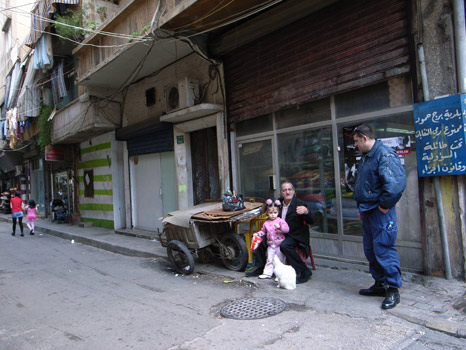
I’m not entirely sure whether he directed his garbled shouting at us especially for the sake of our foreignness, or if perhaps he slurs that cocktail of memory, pride and political anger in all directions all the time, but anyhow, that afternoon my companions and I happened to serve well as the fresh, naîve ears to stop and pay him attention. He sat in a wooden chair on a street corner in the middle of the Armenian neighbourhood of Beirut, and a little girl wearing a bubblegum-coloured sweater and two fluffy pink decorated pigtails stood tucked into the embrace of his wildly gesticulating presence.
He caught sight of us quickly and beckoned us over; she seemed completely indifferent except for the potato chips that inspired her slow repeated movements from the bag to her mouth. Next to them was a covered 三轮车 three-wheel cart with a black plastic bag on top of it. Not really to hide anything, probably mostly out of convenience, the bag contained one bottle of water and one bottle of Johnnie Walker Red Label. Most conveniently, just within his arm’s reach stood a full glass of Klashinkof’s (pronounced like the gun) afternoon aperitif.
Despite his broken English, Klashinkof’s words shot out quickly and fiercely as his name implied, and the little war created by this ranting scene was made all the more extreme by the slow-motion softness of a round-faced little girl eating potato chips and a white cat with one blue eye and the other green, circling around them stealthily like a protective friend or a too-obvious spy.
Over the course of a few minutes, Klashinkof’s banter jumped from colourful quips about the nature of human life (“In the world there is two kinds of holes: you come out from your mother, and the next one, you go down. Two holes.“) to nostalgia over his acting days, Lebanese politics and religious jokes. We find out later that Klashinkof is known by many Beirutis already, his notoriety extending much further than the small radius of this little corner in the Bourj Hammoud area where he lives, works (mafia turned actor turned fish vendor, apparently) and drinks. A friend who also lives in the neighbourhood describes him as “a bold man—fearless, crazy, a specimen of what could be left from the times when Lebanon was full of fearless militias who could talk freely and yell in their own street and region. [The only difference is that] he doesn’t carry a gun anymore. But his hair is still combed back with gel typical of a street boy who tries to seduce women.”
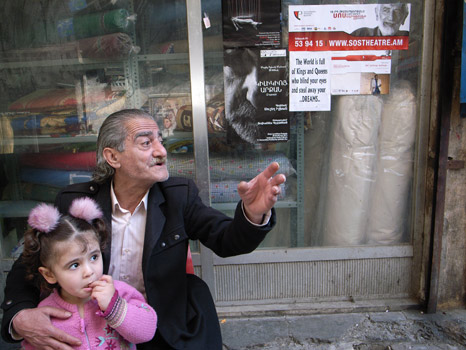
Of course Klashinkof is a performer. And our fascination with him as visitors in an unfamiliar neighbourhood stems at least in part from his ability to attract our attention with his charisma, extravagance and extremity. On an everyday corner in an everyday neighbourhood, we find just a little bit of craziness. And that’s always memorable, now isn’t it?
Why is it that we always tend to forget the banal and remember the extravagant? This cannot be an entirely true statement, of course, because otherwise we would not even be able to remember routines, the people we see on a daily basis or even the days of the week. Both are considered long-term memory, but there is a strong distinction in their qualities, of which cognitive scientists classify as either procedural memory (eg., habits and learned skills like reading or bicycle riding) or declarative (memories that must be cognitively recalled, and can be spoken or written about). We could say that procedural memory may generally describe those banal forms of long-term memory in that they are repetitive and, therefore, carry less emotion in their recollection. Declarative memory, however is often highly implicated with emotion (studies show that thematically induced emotional stimuli aid in the memory of events), and going back to Klashinkof, it’s no wonder that his passionate sentiments were able to carve a strong memory for me and my companions.
.中国北京市 Beijing, China. June 2011.
长胡子叔叔在2011年夏天的日历餐厅做表演。Uncle Longbeard performs at the Calendar Restaurant, Summer 2011.
Back in the place where I live—which on a scale of memorability probably ranks much higher in the banality of procedural activities rather than the declarative, there is another old man who excels at shouting out in the streets, though this man does it for a living rather than out of a disgruntled attitude. Uncle Longbeard is a performer of his own culture, and he 吼卖 calls out old Beijing vendors’ songs not because he is selling anything in particular, but because he performs his own culture as an old Beijinger. He does this for money even, working at Temple Fairs and famous tea houses, but when he spontaneously comes over and sings in our courtyard for us, it is immediately obvious to whom this performance is memorable and to whom it is not. We either eat it up, feeling that authenticity has stumbled upon us, or are merely slightly amused and quickly grow inattentive. Here, what is ‘normal’, at least in terms of its familiarity with our own histories, is not worthy of the space it takes up in our brain storage, but what is ‘exceptional’ delights and leaves a strong impression.
In much the same way, our reactions to Klashinkof were much stronger than those that live in the same neighbourhood and hear his same stories everyday, but what is crucial to note here is that there is a blurry realm in between the synapses of memory, where emotion and familiarity affect our abilities to identify and recall. What happens, then, for our considerations of identity itself? We can say that identity is built from a full spectrum of memories, from the inherited ones of biology (the memory of genes) to those of society (eg., education and cultural memory). And while certain determinants of our identity may be fixed or unavoidable, like race or the social class into which we are born, what should be more carefully considered is the precarity that most of these determinants are really founded upon. To say that one is “Chinese” even, carries a myriad of complex tones and meanings depending upon one’s own associations with the concept of Chineseness. Thus our representations of any such identity can only ever be the playing out of ideas about that concept, whether or not we consciously do it, like Uncle Longbeard, or perhaps just uncontrollably express, like a wildly gesticulating drunk Armenian on a street corner in Lebanon. Judith Butler’s seminal work on gender claims that “identity is performatively constituted by the very ‘expressions’ that are said to be its results”, and the very idea of an expression occurs cognitively at the realm of the symbolic, no matter how clear the links may be or not. These symbols, taken in juxtaposition with human memory, become suddenly much more fallible, subjective constructions than the solidity we may have imagined from abstractions such as “male”, “female”, “Chinese” or even “high-class”. Of course, such ideas are long accrued concepts that stay well bolted into long-term memory, so their flexibility cannot come without a great deal of hitting against the norms of society. And we can never really opt-out of the performance of our identities, so to speak. Uncle Longbeard and Klashinkof are two players of a dying breed, whether of an old Beijing or an old Armenia. They’ve performed their roles so long there is no longer any distinction between performance and history. And that playfulness, or ambiguity, is perhaps something to consider.
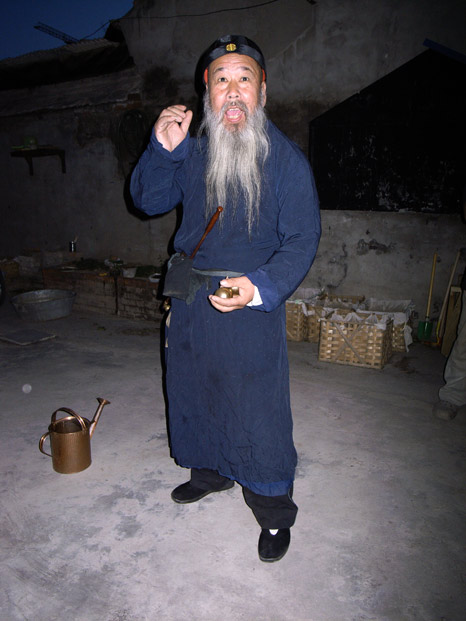
 时间 posted on: 1 June 2012 |
时间 posted on: 1 June 2012 |  发布者 author: e |
发布者 author: e |  评论 comments (5) |
评论 comments (5) | 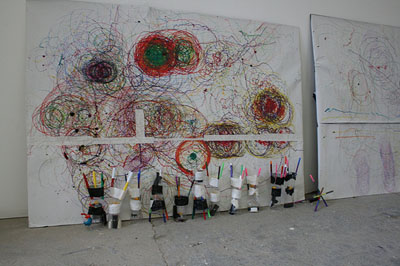
Jonah Brucker-Cohen 艺术家讲座和Drawbot工作坊
Jonah Brucker-Cohen artist talk and Drawbot workshop at HomeShop
时间:周四,五月31号,晚上7点至9点
材料费:15元
Time: Thursday, May 31st 7:00 pm ~ 9:00 pm
Material cost: 15 元
Drawbot工作坊__
Drawbot是一个大家都能使用的绘画的系统,不必学电子技术。它是一个很简单的机器,这个机器是由标准的绘画材料,配重了的马达以及塑料杯组成。当杯子震荡时它们根据全部重量和动力画出圈和线。欢迎来家作坊学习制作你自己的Drawbot!
Drawbot Workshop__
Drawbot is a drawing system that anyone can use without having to learn electronics. It is a simple bot that mixes standard drawing materials (in this case magic markers) with weighted motors and plastic cups. When the cups vibrate, they draw circles and lines depending on their overall weight and power. Come to HomeShop and learn how to make your own!
http://www.coin-operated.com/coinop29/2010/05/02/drawbot-2001/
Talk Description__Dr. Brucker-Cohen will discuss his projects and work in the theme of “Deconstructing Networks” in both physical and online instantiations. He will introduce his projects that attempt to challenge and subvert accepted notions of network interaction from software manipulation and rule-based systems to translating virtual processes and conventions into the physical world. Some projects he will discuss include “BumpList”, an email community for the determined, “Alerting Infrastructure!”, a website hit counter that destroys a building, “PoliceState” a fleet of radio controlled policecars who’s movements are dictated by keywords sniffed on a local network, “Wifi-Hog” a portable system for regaining control of public wireless networks, “Wifi-Liberator” an open source toolkit to broadcast free access to pay-per-use wireless networks, “America’s Got No Talent” a data visuzliation he co-created with Katherine Moriwaki that ranks American Reality Television shows based on their exposure to social media such as Twitter, “SimpleTEXT” a dynamically generated performance that is controlled by participants through texting messages from their mobile phones, and several more projects. These projects deconstruct and challenge the foundations of network connectivity and social experiences online and offline.
____
Jonah Brucker-Cohen is a researcher, artist, and writer. He received his Ph.D. in the Disruptive Design Team of the Electronic and Electrical Engineering Department of Trinity College Dublin. His work and thesis is titled “Deconstructing Networks” and includes over 77 creative projects that critically challenge and subvert accepted perceptions of network interaction and experience. His work has been exhibited and showcased at venues such as San Francisco Museum of Modern Art, MOMA, ICA london, Whitney Museum of American Art (Artport), Palais Du Tokyo,Tate Modern, Ars Electronica, Transmediale, and more. His writing has appeared in publications such as WIRED, Make, Gizmodo, Neural and more. His Scrapyard Challenge workshops have been held in over 14 countries in Europe, South America, North America, Asia, and Australia since 2003.
链接 Links
Interactive Networked Projects__www.coin-operated.com
Scrapyard Challenge Workshops__www.scrapyardchallenge.com
Twitter__http://www.twitter.com/coinop29
 时间 posted on: 29 May 2012 |
时间 posted on: 29 May 2012 |  发布者 author: 家作坊 HomeShop |
发布者 author: 家作坊 HomeShop |  评论 comment (0) |
评论 comment (0) | 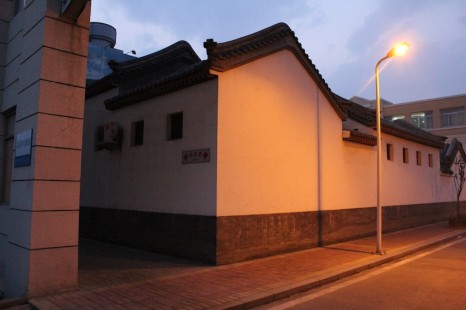
A traditional courtyard house.
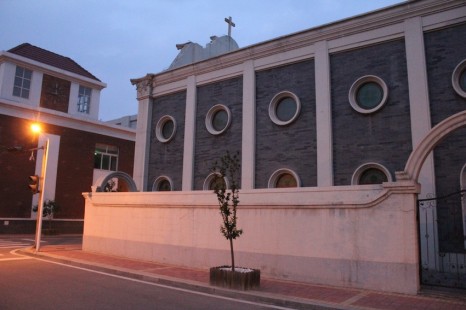
A church, for training purposes.
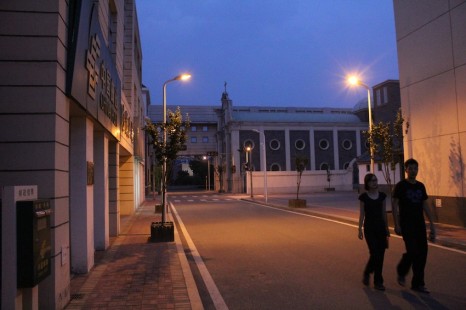
A real post office, on the left.
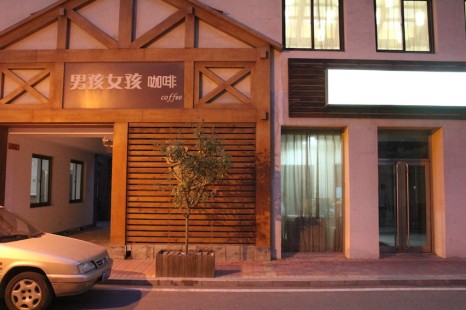
A fake coffee shop next to a real tea shop.

A fake Carrefour
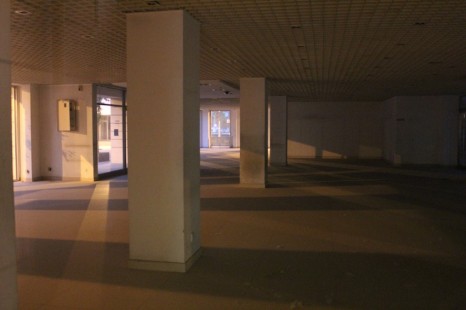

A real supermarket

A fake bank.
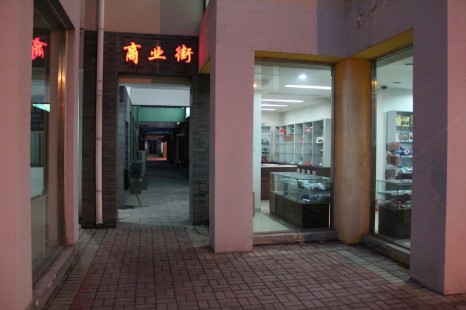
An alleyway next to a real print shop.

A consulate for “Country A.”
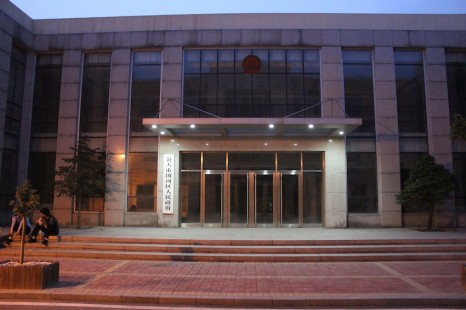
A fake government building.
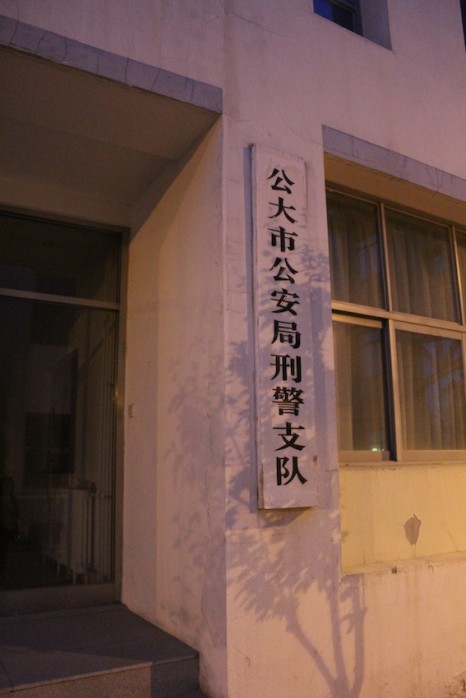
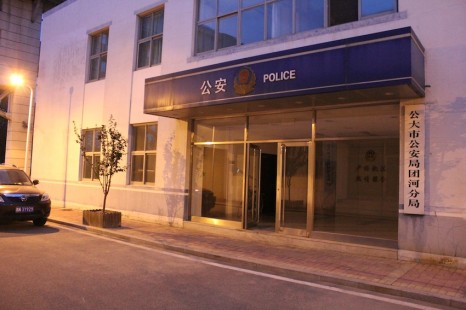
A real police station.
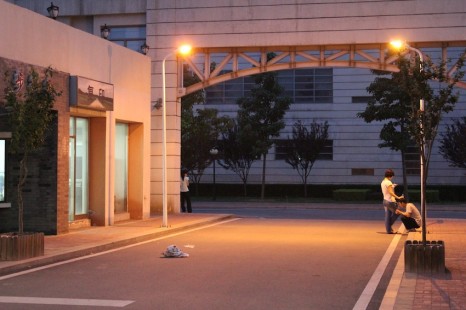
On the edge of town.
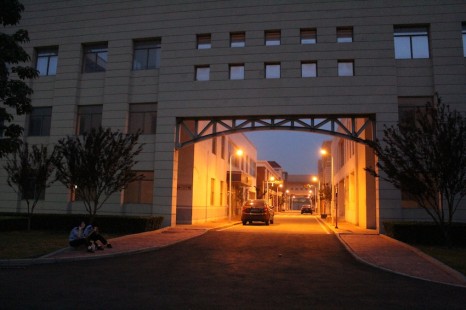
My first attempt to enter the Chinese People’s Public Security University at 7 o’clock on a Thursday morning met with abrupt rejection. “This university is not like others,” the sympathetic but inflexible guard smiled. The following Tuesday I returned and through the magic words of a few contacts, fairly waltzed into the vast and well-kept campus, abuzz with the meticulous workings of early evening. We walked along streets with names like “Loyalty Avenue” and “Diligence Avenue” in a self-contained parallel universe populated by young cops and athletes in various groupings and formations breaking apart, flowing through a corner together, founding blue constellations across the immense, dusking Culture Plaza. No trash cans in this world: trash cans mean trash. No holding hands in this world.
After a review of evening roll call followed by substantial dinner in the cafeteria, we proceeded to a large installation near the heart of the campus, formed of a massive free wall surrounding a model of what appeared to be a European style town center. The traffic lights stood blind and waiting, and through a window above a real dry cleaners came the keening quasi-tunes of karaoke.
The town was neither completely real nor completely fake. Perhaps this diversifying was to make it more interesting, to create a sense that this dead space was somehow half alive, like a permeable, banal amusement park. But as a training ground for how to tackle situations like traffic control and bank robberies, one could also imagine this mixture of shops for daily necessities and the neighboring empty simulations as furnishing the leitmotif of preparedness for social breakdown even on one’s habitual off-hour trips to commissary.
Passing again outside the wall, we cut across the gigantic sports fields to a low building of studio rooms where extracurricular clubs convened. One of our guides, whose major is in processing foreigners and who loves punk music, had offered to let us watch their brand practice. We were treated to a suite of Chinese and American standards including “Every Breath You Take” by the Police, “Desperado” by the Eagles and “Holiday” by Green Day.
No irony in this world. Just the shining, armed citizens with their perfect eyesight (mandated to make it through the gate), honing their creative, sexual energies for the republic.
Holiday
Hear the sound of the falling rain
Coming down like an Armageddon flame (Hey!)
The shame
The ones who died without a name
Hear the dogs howling out of key
To a hymn called “Faith and Misery” (Hey!)
And bleed, the company lost the war today
I beg to dream and differ from the hollow lies
This is the dawning of the rest of our lives
On holiday
Hear the drum pounding out of time
Another protester has crossed the line (Hey!)
To find, the money’s on the other side
Can I get another Amen? (Amen!)
There’s a flag wrapped around a score of men (Hey!)
A gag, a plastic bag on a monument
I beg to dream and differ from the hollow lies
This is the dawning of the rest of our lives
On holiday
(Hey!)
(Say, hey!)
(Wait for it!)
“The representative from California has the floor”
Sieg Heil to the president Gasman
Bombs away is your punishment
Pulverize the Eiffel towers
Who criticize your government
Bang bang goes the broken glass and
Kill all the fags that don’t agree
Trials by fire, setting fire
Is not a way that’s meant for me
Just cause (hey, hey, hey), just cause, because we’re outlaws yeah!
I beg to dream and differ from the hollow lies
This is the dawning of the rest of our lives
I beg to dream and differ from the hollow lies
This is the dawning of the rest of our lives
This is our lives on holiday”
(from the album “American Idiot” by Green Day, 2005)
 时间 posted on: 28 May 2012 |
时间 posted on: 28 May 2012 |  发布者 author: michael eddy |
发布者 author: michael eddy |  评论 comments (3) |
评论 comments (3) |